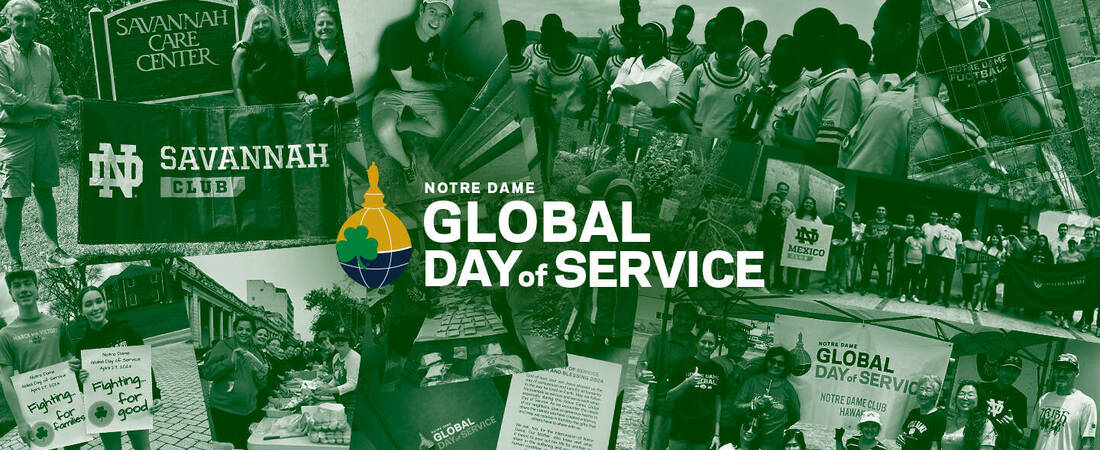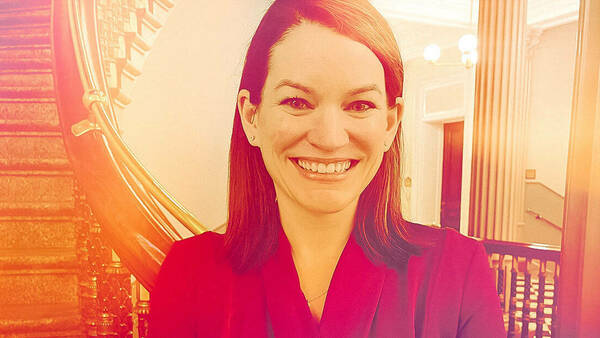When the Notre Dame Alumni Association launched its first Global Day of Service in 2023, it was with the belief that an international network of alumni, parents, and friends had the power to collectively make a positive impact the world over.
This belief, rooted in University founder Rev. Edward F. Sorin’s vision of Notre Dame as “the most powerful means for good in this country,” was soon affirmed when the inaugural service day drew more than 3,500 volunteers to participate in 167 projects in 45 states and 26 countries. Could that reach extend even further?
As it turns out, yes.
Across the globe on April 27, more than 3,000 parents of students, friends of the University, alumni, neighbors, families, and Notre Dame clubs and community members showed up to work alongside one another, dedicating over 12,500 service hours to plant gardens, build homes, paint houses, clean up, spend time with the sick and elderly, and more. The day saw volunteers from 50 states and 30 countries represented, with 189 projects and involvement from 126 Notre Dame clubs.
The Notre Dame Global Day of Service is more than a 24-hour cause — it seeks to be a monumental opportunity for a ripple effect of good, inspiring the Notre Dame community everywhere to commit to a sustainable effort toward creating lasting change in our world. No matter how big or small the project, alumni, parents, and friends are making a difference.
To bring to life this year’s Global Day of Service, we’re highlighting three of the projects organized by Notre Dame clubs and communities aimed at fostering greater justice and compassion in their local communities.
Subscribe to We Are ND to get new alumni stories delivered straight to your inbox!
Planting Lasting Roots in Amman
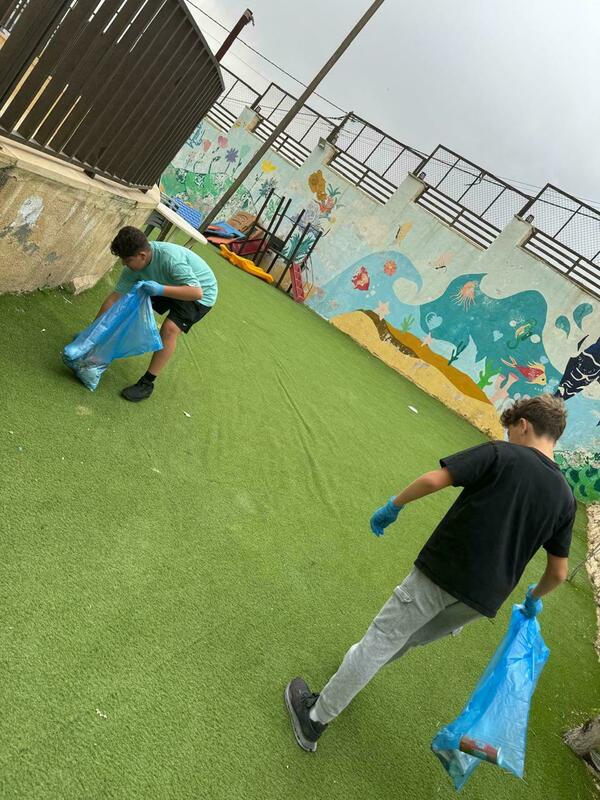
Across the world in Amman, Jordan, approximately 25 community members gathered to learn about an innovative solution to the country’s on-going water shortage problem — it remains the second-poorest country in the world in terms of water access.
Alumna Nisreen Pharaon ’02 organized a personal project in collaboration with Musa Al Saket Cultural Center to educate participants on how to set up and care for a hydroponic system.
Hydroponic farming is the technique of growing plants in a nutrient-rich, water-based solution rather than soil. The practice enables individuals to grow crops indoors or in tight spaces, as well as reduce crop maintenance time.
For community members in Amman, the primary benefit to hydroponic farming is reduced water consumption — as the water solution is constantly reused and redistributed back into the system.
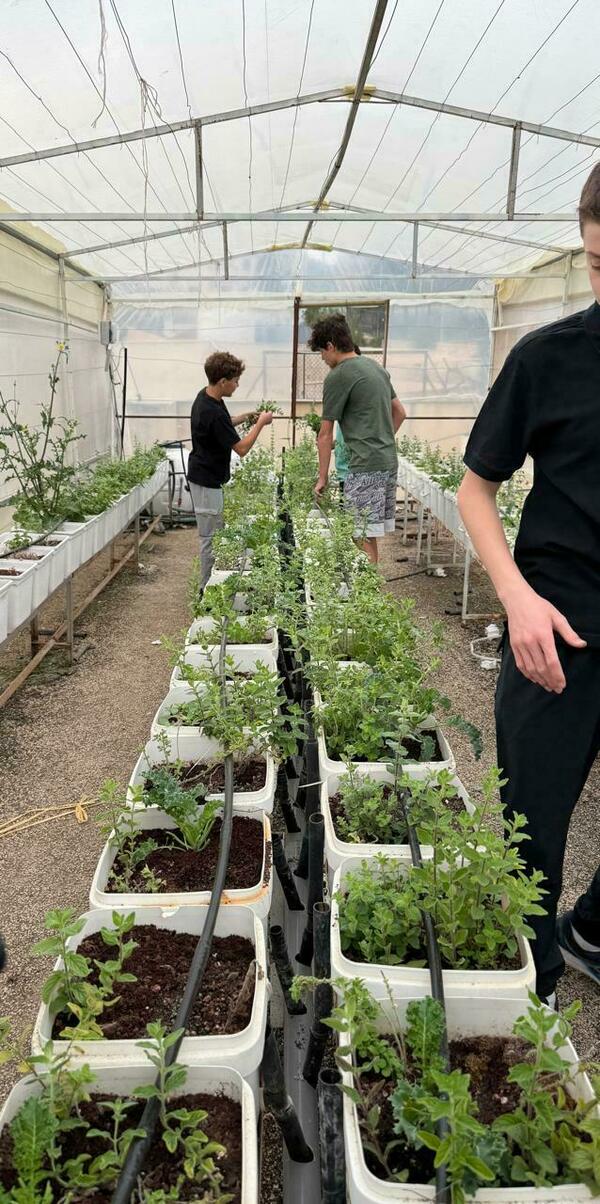
“This is a new project for people to maybe start planting their own crops at home, where they can reuse the water,” Pharaon said.
Pharaon recognizes potential in spreading hydroponics city-wide and utilizing the many vacant rooftops in Amman. “What’s nice about it is, eventually, when we get a whole neighborhood having their crops, they can start selling it in the local market — the farmer’s market on the weekend — or they can share crops between each other.”
After the demonstration, participants had the opportunity to harvest thyme from a hydroponic system before joining the second half of the day’s service: a park clean-up.
“We noticed now that it’s spring and people are out and about and unfortunately some people leave their trash,” Pharaon said. “We went to the park and did a clean-up and afterwards enjoyed some dried thyme with olive oil and bread and some Notre Dame cookies.”
The park is owned and operated by Musa Al Saket Cultural Center. In addition to the new hydroponics initiative, the community development organization also offers other services such as computer classes and a nursery for working parents.
For Pharaon, the project was an opportunity to give back to the community she grew up in.
“Living here in Jordan, I know that we have a lot of dry years and we grow up knowing about water security,” Pharaon said. “I moved out of Central Amman, I’m in the suburbs now. So I see a lot of farmland and it just got me thinking [about how] people can do so much at home.”
Though it began as a Global Day of Service project, Pharaon believes the impact of hydroponic farming will continue to create change far beyond a single day.
“If it can expand, or we can expand it eventually to other towns around Jordan, we have a lot of people living in buildings here, so we have a lot of unused rooftops,” Pharaon said. “We just see that it has great potential for the country.”
Enhancing the Quality of Life in Puerto Rico
At eight o’clock in the morning, volunteers instructed to wear their ND gear and bring sunblock gathered behind the Mall of San Juan, excitedly awaiting the shuttle set to ferry them to the project planned by the Notre Dame Club of Puerto Rico.
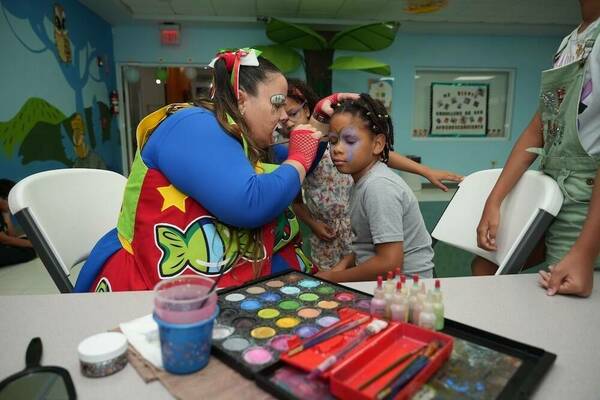
Alex Armas ’94, the club’s Community Service Coordinator, organized a service day with Vimenti — an integrated service center aimed at social, economic, and educational development — full of painting, planting, and playing games with kids in the community.
As Puerto Rico’s first public charter school, Vimenti’s key initiative is to eradicate poverty using a multigenerational method — offering education, healthcare, and wellness services to both students and parents.
“When a child enrolls, the entire family enrolls,” said Charna Boquette, Chief Development Officer at Vimenti.
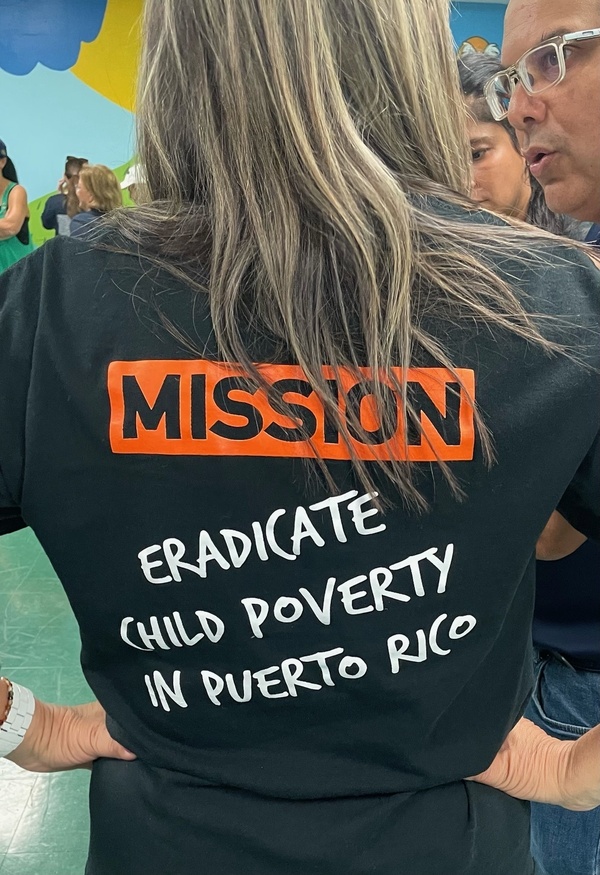
Child poverty in Puerto Rico has stood at 56 percent for more than five decades, more than double the child poverty rate in the United States. With little action taken to solve the problem, The Boys & Girls Club of Puerto Rico launched Vimenti in 2018 with the goal of tackling the systemic poverty plaguing their island.
Helping to initiate that process were two Notre Dame alumni, Victor Rodriguez ’89 and Alejandro Figueroa ’98. Rodriguez, chairperson of the Inaugural Board of Directors of Vimenti, helped during the pre-launch with volunteer leadership and defining financial models for sustainability and growth while Figueroa, vice chair of the Inaugural Board of Directors, assisted with government relations and engagement.
With alumni on the Vimenti board and Notre Dame’s recent launch of its strategic Poverty Initiative, Tricia Pupel ’90 MBA, president of the ND Club of Puerto Rico, saw the partnership to be a good fit.
The two joined forces on the morning of April 27, quickly getting to work in several areas of the school.
The club created two new garden areas, planting more than 160 feet of cilantro, onion, basil, chives, sweet aji, arugula, green cabbage, purple cabbage, miramelindas, begonias, recao, and more.
“I conceived this project after last year's heat wave, wanting to improve the quality of life of the children during their time at school,” said Sherleen Camilo, mother of a third grade student. “I am incredibly happy and grateful to see how school, families and volunteers come together to make this dream come true, creating a garden that not only benefits our children but also strengthens our school community at Vimenti."
In addition to the gardens, volunteers painted five classrooms, including a lab room, as well as several exterior walls. They also organized a large storage closet in the school. Other volunteers spent time with the kids — face painting, playing basketball and other gym games, and sitting with students in the reading nook.

Some volunteers even began working during the week leading up to the scheduled day of service, power washing outdoor areas and pathways.
While the club made a mark in the community in just a day, Armas strongly believes Vimenti will have a lasting impact in Puerto Rico and he’s glad to have been a part of it.
“Having the opportunity to support and assist Vimenti at our Notre Dame Global Day of Service has been a wonderful experience for all participants,” Armas said. “Being able to serve and give our best to others in need is special.”
Redefining Homelessness in Baltimore
Sarah Ceponis ’11 credits her Notre Dame experience for planting the first seeds of her desire to serve others. She left South Bend and moved to Baltimore after graduation to serve with Bon Secours Volunteer Ministry working at a west Baltimore family support center.
“I really feel like Notre Dame gave me a framework for seeing other people pursue volunteer service, and having the confidence to try it. And, and from there … I figured out what I was passionate about and could build a career working with more marginalized neighbors in Baltimore,” Ceponis said.
Today, she still serves the community of Baltimore as interim executive director of Youth Empowered Society (YES), an organization that aims to combat youth homelessness, founded in 2012 by youth in Baltimore that were part of a coalition to address systemic poverty in the city.
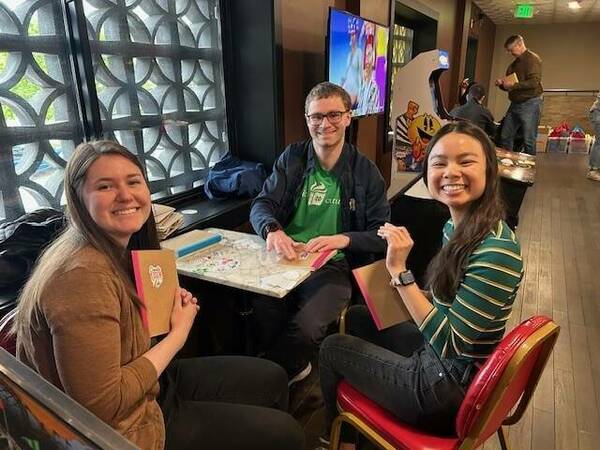
Ceponis was grateful to lead the Notre Dame Club of Maryland through a day of service where volunteers packed hygiene kits for youth experiencing homelessness. The youth YES serves range from ages 14-25, though most are around ages 18-20. For many who utilize YES’s services, this is the first time as a young adult that they have sought help on their own. Often, Ceponis adds, they don’t even realize they are homeless.
“They might think, ‘Oh, I stay with my grandma one night and I stay with my friend one night. … And what that means is they often don't have all the things that we take for granted in our houses, you know, the toiletry supplies, pantry food items, snacks, things like that that we just kind of have that we can we can grab at the store anytime. They don't have access to those things.”
The kits packed by ND Club of Maryland volunteers included headphones, a water bottle, soap, shampoo, toothbrush, deodorant, and a poncho, all packed in a reusable drawstring bag.
“The [day of service] opened our eyes and ears to the enormous unmet needs of the unhoused youth in Baltimore. Sarah is doing great work in this space and we were so pleased to be a small part, along with other ND parents and alumni,” said Chris Figueras, the parent of a current Notre Dame student.
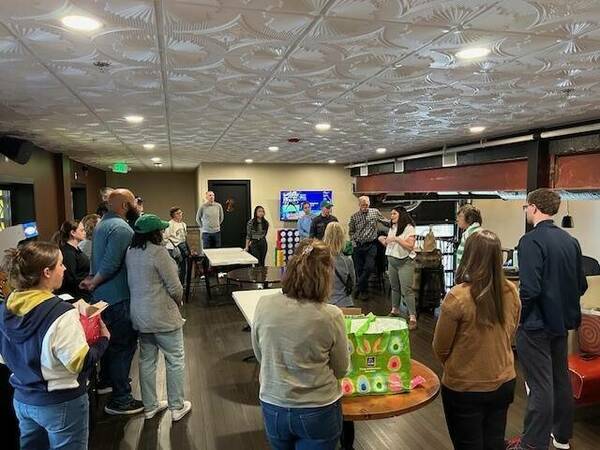
Ceponis made it a point to include an educational component for the day, teaching volunteers about what those who are unhoused go through. The goal was for volunteers to walk away with an altered perspective on homelessness.
“We often think of it as that middle-aged or older adult who's chronically homeless, on the street for a long time … maybe panhandling, or camping in a city park. … So, I really hope that through joining this volunteer effort and hearing a little bit more about YES, volunteers can also learn a different story about what homelessness could mean, how it could be a 16-year-old, a 22-year-old, a young mom with a baby. … It’s important to understand how many stories there are, so we feel more able to find where we can connect and help our neighbors,” Ceponis said.
YES provides a drop-in center, a place where youth can go during the day to have their basic needs met and a place to feel “seen and heard and understood,” Ceponis says. The drop-in center was the heartbeat of the organization until it had to close in 2021 due to COVID. This July, the center will reopen.
The kits packed on Global Day of Service will be used during the first month of the center’s re-opening.
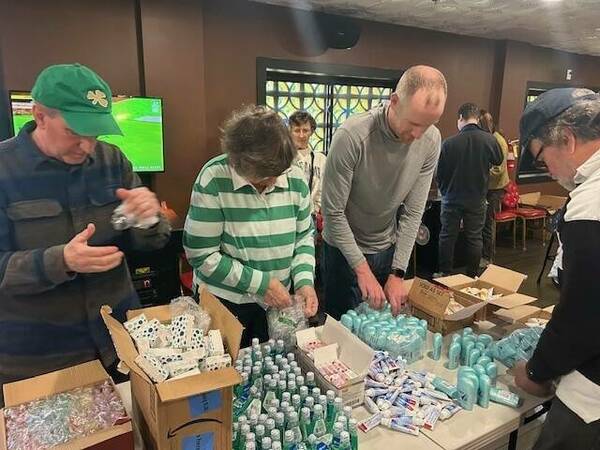
“Spending the afternoon packing kits for YES was a rewarding way to form community within and beyond the Notre Dame family. Our day of service was rooted in compassion, hope, and awareness for utilizing our resources to support homeless youth in achieving independence,” said Alisa Ngyuen ’22.
Ceponis is grateful that the Notre Dame Club of Maryland leadership reached out to her to help in this endeavor. It was a reminder that the Notre Dame family is everywhere, and willing to help.
“One thing that I love about the Notre Dame clubs, wherever I've been, is that it often gives me a nudge to look around my community a little bit more than I would have otherwise. … We're all doing so much and filling our days in a million ways. And when a Notre Dame club invites us to an opportunity to be among friends and neighbors, and look towards community needs, it's always very welcome to take that pause, and say, ‘Oh, yeah, I need to make more time for this.’”
